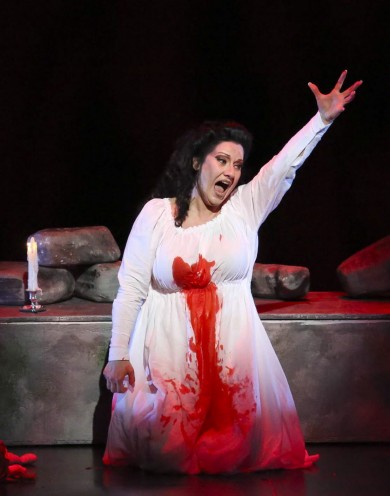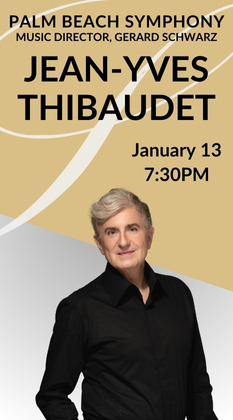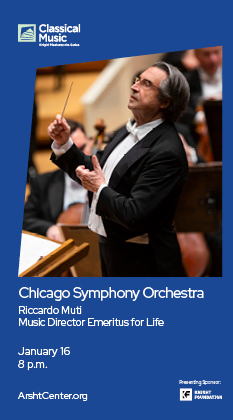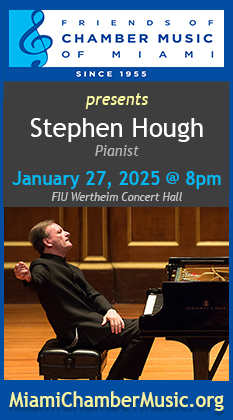Hungarian soprano kills in Palm Beach Opera’s dramatic “Macbeth”
While many composers have created operas based on the plays of William Shakespeare, Giuseppe Verdi seemed to draw special inspiration from the Bard. The Italian master’s final two operas, Otello and Falstaff, arguably his greatest works, are both faithful adaptations of Shakespearian classics. Much earlier, in 1847, Verdi turned to Shakespeare’s Macbeth, crafting a music drama greatly advanced from his earlier scores which were modeled after the bel canto operas of Bellini and Donizetti.
Palm Beach Opera mounted a largely successful production of Verdi’s first Shakespeare opera for its initial presentation of the season, which was vociferously applauded by a full house at the Kravis Center on Friday night. Superb orchestral and choral work under the commanding baton of David Stern, a cast that splendidly encompassed the formidable vocal and dramatic demands of Verdi’s score (with one exception) and, despite some questionable details, a vivid and dramatic staging turned what is sometimes considered a problem opera into an evening of exciting music theater.
The minimalist sets from Florentine Opera in Milwaukee effectively kept the action moving, avoiding long delays between scenes of the four act opera. A few platforms evoked the witches’ caldron, Macbeth’s castle and battlefields, the addition of skeletal walls and trees and atmospheric lighting by Ron Vodicka mirroring the turbulent drama. Colorful Scottish costumes contrasted with the stark black of the witches’ attire, Lady Macbeth’s gowns seemingly part of both worlds.
Lady Macbeth is one of Verdi’s darkest heroines. The role calls for a soprano with the ability to sing flawless coloratura one minute and stentorian declamation the next. It also requires the theatricality to convey the ruthlessness and unspeakable evil scheming of this ambitious wife.
Hungarian soprano Csilla Boross has the vocal chops and charisma to dominate the stage. Her noble bearing turned to ice as she plotted King Duncan’s murder and she gestured with insinuating movements as she alternately hectored and cajoled her husband with plans of mass murder and tyrannical domination.
In the sleepwalking scene, Boross presented a striking portrait of the heroine’s disintegration, the red lighting of the backdrop enhancing her striking word painting of Lady Macbeth’s hallucinations of blood on her hands, her tonal shadings at times reduced to a mere whisper. Boross’ clear, ringing high notes and imperious vocal and dramatic demeanor turned her initial letter scene into a tour de force. Her sheer vocal rage as she evoked the ministers of hell to aid her evil plans was frightening; yet her clean trills and strong coloratura in the drinking song of the banquet scene were the essence of bel canto singing.
As Macbeth Michael Chioldi was a mismatch for Boross’ powerhouse performance. Verdi and Francesco Maria-Piave, his librettist, did not endow the title character with the tragic gravitas of Shakespeare. Still Chioldi too often seemed vocally bland and tended to fall back on stock silent-movie gestures. His warm baritone voice is a size too light for the Scottish monarch, more Germont and Marcello than Iago or Macbeth. He was most effective in Macbeth’s second encounter with the witches, registering terror at the sight of apparitions of his future, but Chioldi was unable to sustain the flowing vocal line of “Pieta, rispetto amore” and his death scene was effortful.
Sean Panikkar, a young tenor, who alternates appearances with the crossover ensemble Forte with leading roles at regional companies and secondary roles at the Met, was a terrific Macduff. His vibrant lyric voice and dark pathos turned “Ah la paterna mano,” Macduff’s lament for his murdered wife and children, into a heart-rending expression of grief.
Richard Wiegold , a Welsh bass with Wagnerian credentials, brought deep vocal gravitas and noble bearing to the ill fated Banquo. Joseph Dennis was a strong Malcolm, rousing in duet with Panikkar.
Stern led a fiery, rhythmically vital reading of the score, never letting tension flag and exhibiting real affinity for the ebb and flow of Verdi’s melodies. The orchestra responded superbly, playing with finely controlled dynamics and full bodied, vigorous ensemble. The excellent chorus under Greg Ritchey was a tower of strength. Whether playing witches, courtiers or the oppressed Scottish populace, the chorus displayed vocal precision and rich sonority.
Bernard Uzan’s staging kept the emphasis on the Macbeths, moving the action swiftly. The choral scenes were beautifully coordinated, staged for maximum dramatic effect as when the Macbeths face Macduff and his wife at the conclusion of the ensemble after Duncan’s murder.
Some gratuitous touches seemed out of place, such as the opening pantomime (set to the prelude) with Lady Macbeth coming to see the witches who give her a knife or Macduff holding the corpses of his children during his aria. Still, for the most part, this production serves Verdi’s first Shakespeare opera admirably, fusing vivid theatrics with an exciting reading of the score.
Palm Beach Opera repeats Macbeth 7:30 p.m. Saturday and 2 p.m. Sunday. Luis Ledesma and Jennifer Check perform the principal roles on Saturday. pbopera.org; 561-833-7888.
Posted in Performances
One Response to “Hungarian soprano kills in Palm Beach Opera’s dramatic “Macbeth””
Leave a Comment
Sat Jan 25, 2014
at 12:16 pm
1 Comment








Posted Jan 26, 2014 at 4:36 pm by Valerie Rhodes
The “gratuitous touch” of Macduff cradling his child(ren) was especially touching to those who knew that Macduff’s daughter was Panikkar’s 5 year old daughter in real life.